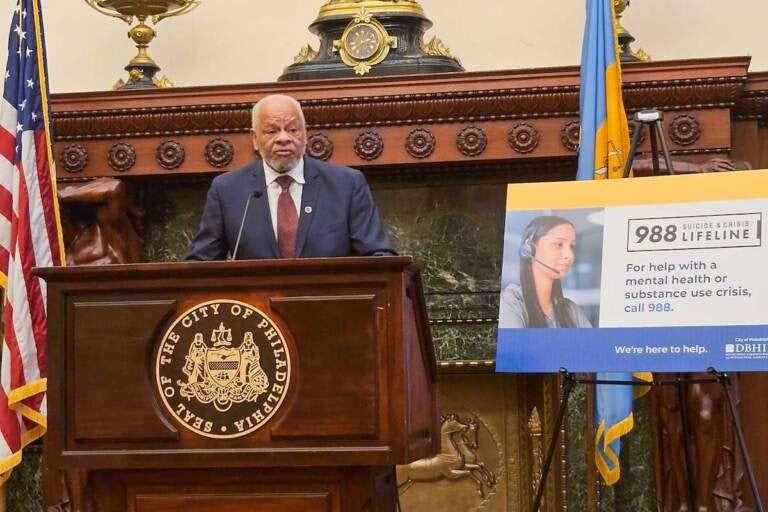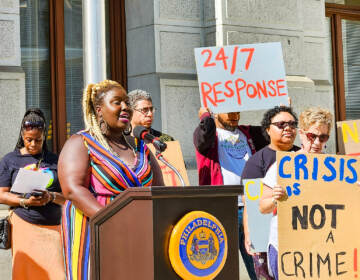Philly marks one year anniversary of 988 suicide and crisis lifeline as city leaders announce new projects in the pipeline
Philadelphia leaders announced plans to build on 988 services and expand behavioral health crisis options throughout the city in the coming years.

John White is president and CEO of the Consortium Inc., a community mental health center and one of four provider members of Philadelphia's mobile crisis response unit network. (Nicole Leonard/WHYY)
A year ago this week, the national suicide and crisis lifeline re-launched as 988 – a new three-digit number designed to be an easier way for people to call for help.
As Philadelphia’s behavioral health needs continue to remain high, city leaders say they’re building on the 988 rebrand and have several new projects that will expand access to mental health and crisis care over the next few years.
Dr. Jill Bowen, commissioner of the city Dept. of Behavioral Health and Intellectual disAbility Services, said it’s all part of a larger strategy to improve services across the city.
“It calls for a shift to a systemic approach, focused on easing trauma and doing everything we can not to add trauma for a person who is already in distress,” she said Friday at City Hall.
Local calls to the national 988 line, which is a 24/7 service, are routed to Philly-based centers staffed with professional counselors who can work with people in distress over the phone.
Calls to 988 in Philadelphia in 2022 jumped 14% when compared to the number of calls in 2021, according to city data. Bowen said higher call volumes continue into this year.
“We believe this increase is occurring both because of increased awareness of 988 and the Philadelphia Crisis Line in general,” she said, “but also due to the ongoing high levels of distress in the community.”
When more care and help is needed, cases are referred to the city’s mobile crisis response units, a network of four community behavioral health organizations that send out teams of experts to people in crisis.
Mobile crisis unit dispatches were up 37% in 2022 compared to the previous year, officials said.
John White is president and CEO of the Consortium Inc., a community mental health center that has provided mobile crisis services in the city for 30 years. White said 988 and expanded access to crisis care has made some progress, but there’s more to be done.
“Trauma is real and it’s important that people know where they can go to get help to address their trauma,” he said. “We need to make sure that we are connecting [them] to those services that are available after the crisis so that people can get into care.”
The city has hired more staff and professional counselors at its crisis call centers to handle rising demand for services, and now have civilian experts embedded in 911 dispatch centers to better identify behavioral health crisis calls and send appropriate care.
Bowen said the city plans to open a fifth Crisis Response Center. The Crisis Response Centers take mental health and substance use-related emergency cases, perform evaluations, and link people to medication assisted treatment and other services.
The new center will be in West Philadelphia and is expected to open sometime next month.
With an additional $3 million allocated in the city budget for the mobile crisis response units, the program will establish bridge shifts or teams that can respond to crisis calls at times when demand is especially high across the city.
Providers said this will help lead to faster response times, which are averaging at over an hour per call right now.
Bowen said the city is working on a long-term crisis stabilization team or assistance service that could provide people with up to six weeks of follow up care after an initial crisis, “to prevent reemergence of a crisis.”
Philadelphia officials are also planning to open a behavioral health urgent care center for adults, which Bowen said would be the first one in the city.
If you or someone you know is in crisis, call or text the National Suicide Prevention Lifeline at 988. The hotline is staffed 24/7 by trained counselors who can offer free, confidential support. Spanish speakers can call 1-888-628-9454. People who are deaf or hard of hearing can call 1-800-799-4889.

Get daily updates from WHYY News!
WHYY is your source for fact-based, in-depth journalism and information. As a nonprofit organization, we rely on financial support from readers like you. Please give today.






